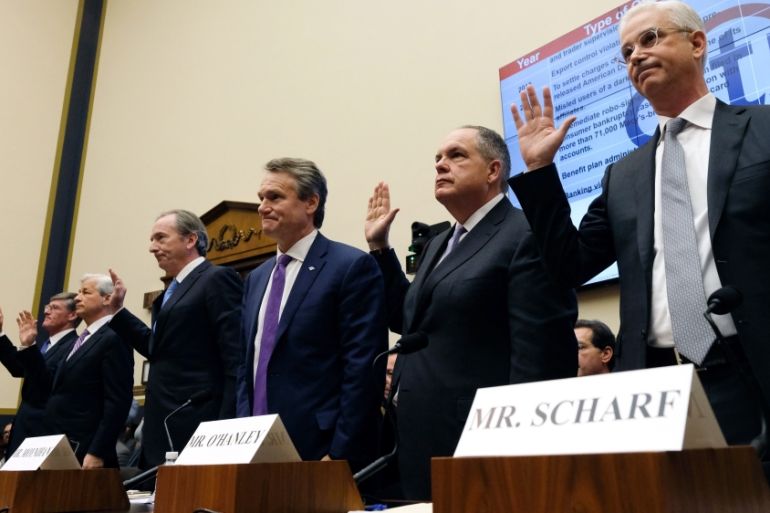Should businesses put social impact above profit?
Corporate titans, including CEOs of Amazon and JPMorgan, say that shareholders’ interests should not be top priority.

The mantra “the shareholder comes first” has long been the governing ethos of the Business Roundtable, a group that represents the most powerful chief executive officers in the United States.
But a new document about the role of corporations that was published on Monday advocates a foundational shift, putting shareholders on more equal footing with other stakeholders who share an interest in the same company: workers, consumers, and ultimately, society as a whole.
Keep reading
list of 4 itemsBoeing hit with 32 whistleblower claims, as dead worker’s case reviewed
US imposes new sanctions on Iran after attack on Israel
A flash flood and a quiet sale highlight India’s Sikkim’s hydro problems
“We know that many Americans are struggling,” the statement reads. “Too often hard work is not rewarded, and not enough is being done for workers to adjust to the rapid pace of change in the economy.”
“If companies fail to recognize that the success of our system is dependent on inclusive long-term growth, many will raise legitimate questions about the role of large employers in our society,” it continues.
The statement of corporate purpose, which shifts from shareholder primacy, was signed by the heads of more than 180 US companies, including the CEO of Amazon.com Inc.
The text is implicit recognition both that corporations have a larger responsibility than mere return on investment and that more Americans are today living under financial duress.
Wage gains have been nonexistent to moderate for years. Economic research and government data point to an era in which Americans must do more for less.
An analysis by the Federal Reserve Bank of St Louis recently found that corporate profits have far outpaced employee compensation since the early 2000s.
“The American dream is alive, but fraying,” Jamie Dimon, who is the chairman and CEO of JPMorgan Chase and who chairs the Business Roundtable, said in a prepared statement.
‘The needs of all stakeholders’
The Business Roundtable’s principles have largely been rooted in the words of economist Milton Friedman, who argued that the sole purpose of a corporation was to maximise shareholder value.
But the language of the group’s mission statement has been tweaked over the years, sometimes drawing distance between Friedman and the executives, who range from the head of the largest US bank to the CEO of the world’s largest airline.
“This new statement better reflects the way corporations can and should operate today,” said Alex Gorsky, chairman and CEO of Johnson & Johnson. “It affirms the essential role corporations can play in improving our society when CEOs are truly committed to meeting the needs of all stakeholders.”
During a recession in the early 1990s, the statement said corporations were meant to “serve both their shareholders and society as a whole”.
In the recovery years following the Great Recession, the group said it was up to a corporation to be responsible in dealing “with its employees, customers, suppliers and other constituencies in a fair and equitable manner”.
There may be increasing momentum to find a solution to financial inequality in the US as it grows worse. The national narrative in the lead-up to the 2020 presidential election appears to have shifted in this direction.
Democratic presidential candidates have pushed for creating a seat that is chosen by employees on all corporate boards and for tying stock buybacks – which benefit investors – to employee pay.
The push to rethink the role of corporations in society has not come exclusively from the political arena. This time, there is pressure from Wall Street power brokers as well.
In April, the renowned hedge fund manager Ray Dalio stunned Wall Street with an extended essay in which he wrote, “everything must evolve or die. This is now true for capitalism”.
“It’s producing self-reinforcing spirals: up for the haves and down for the have-nots,” Dalio wrote. “This is creating widening income/wealth/opportunity gaps that pose existential threats to the United States because these gaps are bringing about damaging domestic and international conflicts and weakening America’s condition.
Simply changing the mission statement for the Business Roundtable may not make a tangible difference, but economic pressure on corporations, workers and consumers may grow more intense in the near future.
The statement marks the first time that the nearly 50-year-old group has said shareholder value is not the biggest priority for corporations. It comes at a time when companies are increasingly taking stances on issues outside of the corporate sphere, due to pressure from activists amplified across social media and due to calls from their own employees.
The statement outlines five priorities, including commitments to provide fair wages and benefits, support communities where they operate, and deal ethically with suppliers.